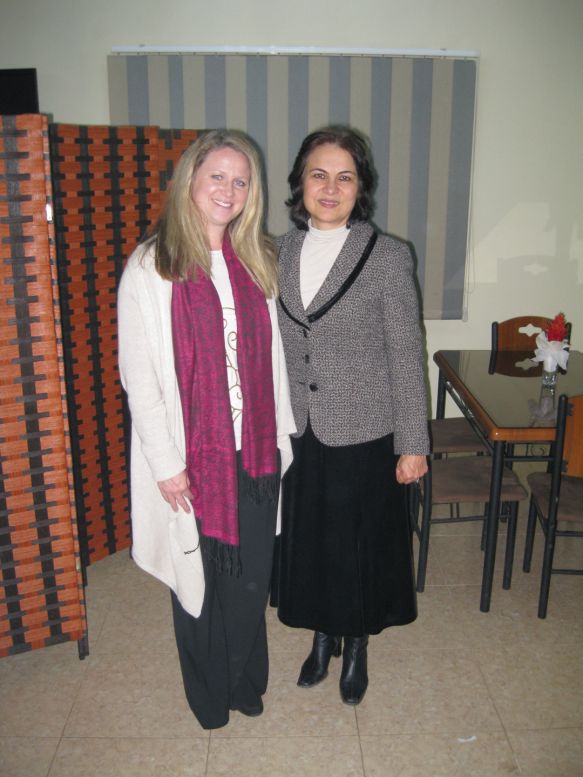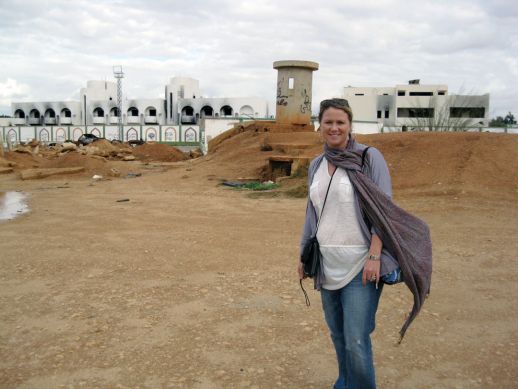

The hub of the Arab Spring, Libya has been a country of upheaval for the past year. Words associated with the movement include youth, riots, technology, corruption, government and leadership.
It is that last word that strikes the connection between this far away country and Cabrini College assistant professor of business, Vonya Womack, who traveled to Libya from Jan. 1-18 to provide training for the Leadership Institute.
Womack worked closely with Iman Bugaighis, an orthodontist who transfigured into the spokesperson for the Feb 17th coalition. Bugaighis and 12 other committee members helped oversee Libya after the revolution and through the post-Gadhafi turmoil.
“There is a huge need in Libya to help train people in conflict and mediation,” Womack said. “They ask for that.”
The Leadership Institute consisted of 10 days at the Benghazi Hospital where she trained professionals from the Ministry of Health, medical professionals and hospital staff, as well as professors, lawyers and judges alongside fellow American Lisa Gibson, executive director of Peace Prosperity and Alliance, located in Colorado Springs, Colo. Gibson has a personal tie to Libya, as tragic as it may be. Her brother was on the PanAm flight over Lockerbie that Gadhafi was accused of destroying. She has turned her personal devastation into a commitment to the Libyan people.
There were four Americans and one French person also working at the Leadership Institute through a program called Silk Roads. Womack was able to assist them in cross-training intercultural intelligence to Afghan leaders and community workers.
Because of her teaching profession, Womack felt a very close connection to the city of Benghazi. Benghazi was neglected and tortured by Gadhafi because of the intellectuals who inhabit the city through the University. She states that every professor she met had been thrown in jail at some point by Gadhafi.
“If you were an intellectual in Libya, you always feared for your life,” Womack said. “The more you knew, the more of a danger you were.”
Understanding the suffering Libyans have endured under the dictator makes the need for communication throughout the Middle East great, especially between the revolutionaries and the new government. People want change immediately and maybe rightfully so after so much wrongdoing to them but realistically, governments and countries take time to adapt.
“People do not understand that it will probably take at least two months for the government to transition. There is a real fear of the young people,” Womack said. “The elections are in June and I hope that it stays stable until then but it is a process of changing. America did not become what it was without any conflict.”
The type of communication and management training that Womack did in Libya is crucial. In a country that has been ruled by a dictator, there is great need for new leaders to be trained with successful tactics.
Understanding the cultural cues is key to a successful training problem. Womack found little differences amongst the people of Libya that really made a big impact. For example, she saw firsthand how Libyans value relationships and how that is key for others in understanding their desires and goals for the future.
“Libyans are very relational, they take care of relationships or settle a debate before they show up on time,” Womack said.
Many professionals in global development agree that a key to successful growth is the assistance of those in developed countries but that those who aid cannot think they can just come in and force the “American way” upon an entirely different society. Therefore, the type of work Womack did is of the most successful kind: seeing and learning the cultural differences and helping leaders learn the most successful practices for effective management and communication so their country may know sustainability and prosperity.
In the future, Womack would like to take college students on a cross-cultural experience to the Middle East. She lives by the quote, “qatra qatra darya mEsha,” which means, “drop by drop a river is made.”
“You learn so much more than you can ever give. If nobody does anything, nothing changes,” Womack said. “You see sometimes it may just be the little things that get a process going and for me the reward is watching the process develop even if it was only a drop that I could contribute.”


